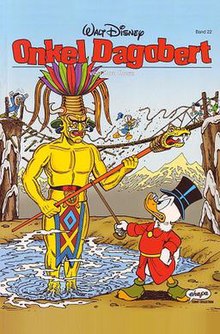Plot
The story continues directly from Rosa's earlier story "Treasure under Glass". Recently having found a map of all sunken treasure ships in the 17th century, Scrooge McDuck, Donald Duck, and his nephews are retrieving treasures from them. From a sunken ship named Dukatenesel, Donald obtains a golden plaque commemorating the founding of an Augsburgian Welser consortium in New Granada on February 21, 1539. This intrigues Scrooge, so he, Donald, and the boys head off to Germany to find out more.
In Germany, the Ducks head to Nuremberg, where they meet with the banking company that currently owns the remains of the bank founded in New Granada around 1539. As Scrooge buys the remains of the bank at a price of $1,000, the director of the banking company explains that the Welser bank still has a branch office somewhere in Latin America, but its exact location has been lost. As the Ducks leave, the director telephones the company's owner, Flintheart Glomgold. Eager to find out what Scrooge is up to, Glomgold catches the first plane from South Africa to Germany and arrives in Nuremberg to spy on the ducks.
All that remains of the Welser bank is a safe deposit box containing the bank's documents. The adventurers study the documents, finding out that the bank was founded by Gonzalo Jiménez de Quesada, Nicolaus Federmann, and Sebastián de Belalcázar, who had met each other at the Cundinamarca Plateau in Omagua and made a contract with each other. When Huey, Dewey, and Louie tell Scrooge that Omagua is also known as Eldorado , Scrooge becomes interested in finding this lost place. The boys' Junior Woodchucks Guidebook tells them that the documents confirming the ownership of Eldorado were given to a monastery in Bogota, Colombia, so the Ducks decide that they should head there next. Unknown to them, Glomgold has been spying on them all this time, disguised as a waitress, so he decides to follow them to Bogota.
When the Ducks reach the monastery on the Cundinamarca Plateau, the abbess tells them that their archives are off-limits to outsiders, due to the theft of the golden plaque in 1580 which was perpetrated by the monastery's founder, and the nuns haven't trusted outsiders ever since. Scrooge hands the abbess the very golden plaque he holds and she graciously grants the Ducks permission to visit the archives.
In the archives, the Ducks find the original contract signed by de Quesáda, Federmann, and de Belalcázar, but Glomgold, disguised as a nun, immediately steals it before running off. Donald recognizes Glomgold and runs after him. Glomgold runs across an old bridge over a deep chasm, and once he has reached the other side, he cuts the bridge off, leaving Donald stranded in the middle. Fortunately, Donald is soon rescued and the contract is now in Scrooge's hands, so the Ducks have time to study it in peace and are able to find the lost location of Eldorado.
The Ducks rent a bulldozer and load it onto a truck similar to the one featured in The Wages of Fear , which they drive in search of Eldorado. They meet a tour guide, but when they ask him for help, he claims that Eldorado is just a fairy tale, so the Ducks head off in search of Eldorado on their own. Glomgold follows them and, to sabotage their journey, drops a large boulder behind their truck, which starts to roll, so Donald has to drive incredibly fast to escape it. Finally they arrive at Lake Teusacá, where the plaque they found at the start of the story claimed Eldorado was located. Their truck snaps in half, but the bulldozer is intact, so Scrooge digs the ground and drains the entire lake but finds nothing but stinky mud. Glomgold catches up with the Ducks, disguised as a Colombian native, and asks Scrooge to sell the bank back to its original owner, but Scrooge easily sees through the disguise. They still find nothing after digging the mud, but Huey, Dewey, and Louie figure out that the treasure must be hidden somewhere else, so they head out to search for it. Eventually, they stumble on a large boulder with the imprint of the golden plaque they found at the start of the adventure, and deduce that the densely grown forest in the valley beneath it must once have been a lake, but Jiménez de Quesáda drained the lake and grew a forest instead to hide the location of the treasure. Unfortunately, Glomgold has also stumbled on the treasure. He ties up the boys to prevent them from reaching Scrooge with the news.
In the meantime, Scrooge's digging has caused the rock faces surrounding the lake to become dangerously unstable. Oblivious to this, Scrooge and Glomgold argue about the ownership of the bank, so Donald has to find his missing nephews alone. He releases them from their bonds and together they head back to the lake bottom, where they rescue Scrooge and Glomgold (still in the middle of arguing) from an impending collapse. Scrooge sells the bank back to Glomgold at the last moment before the rock face collapses, revealing untold riches hidden beneath the bottom of the forest the boys had found. Glomgold thinks he has won all these riches for himself, but Scrooge tells him that he only sold him back the bank - the riches are a deposit belonging to an account holder, namely Scrooge himself, and as Glomgold's bank hasn't paid any interest to the account in 469 years, Glomgold basically owes Scrooge everything he owns and will ever earn in his lifetime.
However, Scrooge's joy is cut short when two Colombian tax inspectors arrive, and inform him that since the bank never paid any taxes to the Colombian state since the death of Quesáda in 1579, it and all its deposits were surrendered to the state in 1637, over 300 years ago, so neither Scrooge nor Glomgold has any claim to any of the riches.
Scrooge takes the loss philosophically, since he is allowed to keep the deed as a souvenir, plus the memory of the moment when Glomgold thought he owed Scrooge all the money in the world. Finally Scrooge tricks a Colombian tourist guide into selling Glomgold a map to the lost treasure of the Inca, which they had already found in Rosa's earlier story The Son of the Sun , driving Glomgold mad, to Scrooge's amusement.

Carl Barks was an American cartoonist, author, and painter. He is best known for his work in Disney comic books, as the writer and artist of the first Donald Duck stories and as the creator of Scrooge McDuck. He worked anonymously until late in his career; fans dubbed him The Duck Man and The Good Duck Artist. In 1987, Barks was one of the three inaugural inductees of the Will Eisner Comic Book Hall of Fame.

Scrooge McDuck is a cartoon character created in 1947 for The Walt Disney Company by Carl Barks. Appearing in Disney comics, Scrooge is a Scottish-born American anthropomorphic Pekin duck. Like his nephew, Donald Duck, he has a yellow-orange bill, legs, and feet. He typically wears a red or blue frock coat, top hat, pince-nez glasses, and spats varying in color. He is portrayed in animation as speaking with a Scottish accent. Originally intended to be used only once, Scrooge became one of the most popular characters in Disney comics and Barks' signature work. Scrooge is an extremely rich duck who lives in the city of Duckburg in the fictional US state of Calisota, whose claimed location is in California in the real-world United States.
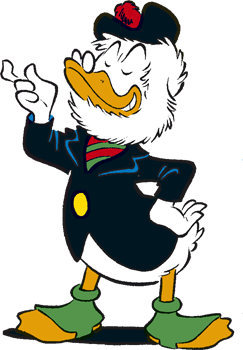
Flintheart Glomgold is a cartoon character created in 1956 by Carl Barks. He is a South African American Pekin Duck and the business rival of Scrooge McDuck, usually portrayed as an ambitious, ruthless, and manipulative businessman who shares many of the same qualities as Scrooge—the drive for massive wealth, and the cunning and creativity to obtain the same—but he lacks any of Scrooge's tendencies towards generosity and compassion. In Don Rosa's The Life and Times of Scrooge McDuck, he is said to be a Boer.

The Donald Duck universe is a fictional shared universe which is the setting of stories involving Disney cartoon character Donald Duck, as well as Daisy Duck, Huey, Dewey, and Louie, Scrooge McDuck, and many other characters. Life in the Donald Duck universe centers on the city of Duckburg and is a part of the larger Mickey Mouse universe. In addition to the original comic book stories by Carl Barks, the Duckburg cast was featured in Little Golden Books, television series such as DuckTales (1987–1991), Darkwing Duck (1991–1992), and the DuckTales reboot (2017–2021), and video games such as DuckTales (1989), QuackShot (1991), Goin' Quackers (2000), and DuckTales: Remastered (2013).

El Dorado is commonly associated with the legend of a gold city, kingdom, or empire purportedly located somewhere in the Americas. Originally, El Hombre Dorado or El Rey Dorado, was the term used by the Spanish in the 16th century to describe a mythical tribal chief (zipa) or king of the Muisca people, an indigenous people of the Altiplano Cundiboyacense of Colombia, who as an initiation rite, covered himself with gold dust and submerged in Lake Guatavita.
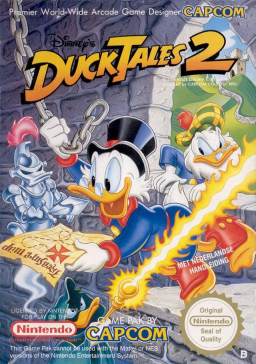
DuckTales 2 is a platform video game developed and published by Capcom. It is a sequel to the original DuckTales based on the Disney animated series of the same name. It was released on the Nintendo Entertainment System in early 1993. The title was ported to the Game Boy handheld system in Japan and North America at the end of the year.

Nikolaus Federmann was a German adventurer and conquistador in what is modern-day Venezuela and Colombia. He is a significant figure in the history of Klein-Venedig (1528–1546), the concession of Venezuela Province that Charles I of Spain granted to the Welser banking family and the foundation of Santafe de Bogotá.
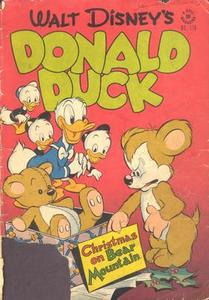
"Christmas on Bear Mountain" (1947) is a Donald Duck story by Carl Barks, first published in Dell Comics Four Color Comics #178. It was the first appearance of Scrooge McDuck, a character who became a comic-book icon throughout the world.

"Return to Plain Awful" is a Donald Duck story that was originally printed during the Gladstone Publishing run of Donald Duck Adventures, issue #12 in May 1989. It was written by Don Rosa as a sequel to "Lost in the Andes!" by Carl Barks, to commemorate that story's 40th anniversary.

Zoratama, also spelled as Soratama, was a Muisca woman and the lover of Spanish conquistador Lázaro Fonte. Her story reminds of the North American indigenous Pocahontas who married John Rolfe after saving the life of John Smith.
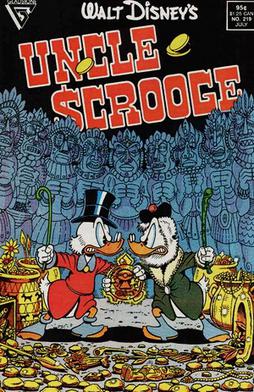
"The Son of the Sun" is the first Scrooge McDuck comic by Don Rosa, first published in Uncle Scrooge #219 in July 1987. It is a well-known comic book story that features Disney's Scrooge McDuck, Donald Duck, and his three nephews. This story is most notable for establishing Don Rosa as a major talent in the Disney comic book industry, as well as fulfilling Rosa's childhood dream of becoming a writer/illustrator of stories featuring Scrooge McDuck.

Klein-Venedig or Welserland was the most significant territory of the German colonization of the Americas, from 1528 to 1546, in which the Welser banking and patrician family of the Free Imperial Cities of Augsburg and Nuremberg obtained colonial rights in the Province of Venezuela in return for debts owed by the Holy Roman Emperor Charles V, who was also King of Spain. In 1528, Charles V issued a charter by which the House of Welser possessed the rights to explore, rule and colonize the area, also with the motivation of searching for the legendary golden city of El Dorado. The venture was led at first by Ambrosius Ehinger, who founded Maracaibo in 1529. After the deaths of Ehinger (1533) and then his successor Georg von Speyer (1540), Philipp von Hutten continued exploration in the interior, and in his absence from the capital of the province, the crown of Spain claimed the right to appoint the governor. On Hutten's return to the capital, Santa Ana de Coro, in 1546, the Spanish governor Juan de Carvajal had von Hutten and Bartholomeus VI. Welser executed. King Charles V revoked Welser's charter.

"The Second-Richest Duck" is an Uncle Scrooge comic book story written and illustrated by Carl Barks in February 1956. It features the first appearance of Flintheart Glomgold.

"A Little Something Special" is a 1997 Disney comics story created by Don Rosa to celebrate the 50th anniversary of Scrooge McDuck's first appearance in Carl Barks's "Christmas on Bear Mountain" in 1947.

"The Treasure of the Ten Avatars" is a 1996 Donald Duck story by Don Rosa.

DuckTales: Remastered is a Metroidvania-style platform video game developed by WayForward Technologies and published by Capcom. The game is a high-definition remake of DuckTales, a game released on the Nintendo Entertainment System in 1989. It was released for multiple gaming platforms, including the PlayStation 3, Wii U, Windows, and Xbox 360, over a three-month period between August and November 2013, and later expanded to Android, iOS, and Windows Phone in April 2015. The game was temporarily delisted from digital storefronts in August 2019, but was relisted in March 2020.
"Treasure under Glass" is a 1991 Uncle Scrooge comic story by Don Rosa.
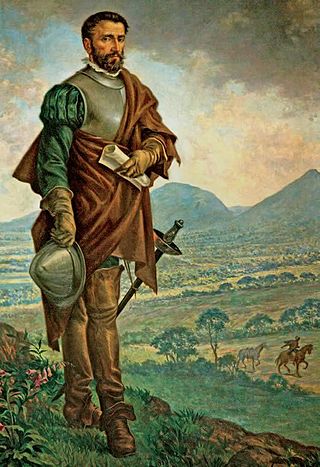
The Spanish conquest of the Muisca took place from 1537 to 1540. The Muisca were the inhabitants of the central Andean highlands of Colombia before the arrival of the Spanish conquistadors. They were organised in a loose confederation of different rulers; the psihipqua of Muyquytá, with his headquarters in Funza, the hoa of Hunza, the iraca of the sacred City of the Sun Sugamuxi, the Tundama of Tundama, and several other independent caciques. The most important rulers at the time of the conquest were psihipqua Tisquesusa, hoa Eucaneme, iraca Sugamuxi and Tundama in the northernmost portion of their territories. The Muisca were organised in small communities of circular enclosures, with a central square where the bohío of the cacique was located. They were called "Salt People" because of their extraction of salt in various locations throughout their territories, mainly in Zipaquirá, Nemocón, and Tausa. For the main part self-sufficient in their well-organised economy, the Muisca traded with the European conquistadors valuable products as gold, tumbaga, and emeralds with their neighbouring indigenous groups. In the Tenza Valley, to the east of the Altiplano Cundiboyacense where the majority of the Muisca lived, they extracted emeralds in Chivor and Somondoco. The economy of the Muisca was rooted in their agriculture with main products maize, yuca, potatoes, and various other cultivations elaborated on elevated fields. Agriculture had started around 3000 BCE on the Altiplano, following the preceramic Herrera Period and a long epoch of hunter-gatherers since the late Pleistocene. The earliest archaeological evidence of inhabitation in Colombia, and one of the oldest in South America, has been found in El Abra, dating to around 12,500 years BP.
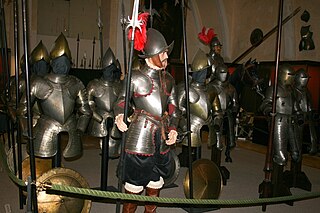
Hernán Pérez de Quesada, sometimes spelled as Quezada, was a Spanish conquistador. Second in command of the army of his elder brother, Gonzalo Jiménez de Quesada, Hernán was part of the first European expedition towards the inner highlands of the Colombian Andes. The harsh journey, taking almost a year and many deaths, led through the modern departments Magdalena, Cesar, Santander, Boyacá, Cundinamarca and Huila of present-day Colombia between 1536 and 1539 and, without him, Meta, Caquetá and Putumayo of Colombia and northern Peru and Ecuador between 1540 and 1542.
